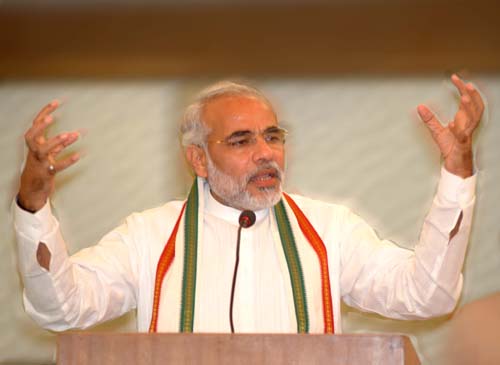Narendra Modi's book JyotiPunj follows Advani's My Country, My Life

After Opposition leader L K Advani’s memoirs, My Country, My Life, it’s now the turn of Gujarat Chief Minister Narendra Modi’s new book Jyotipunj to create a controversy.
Narendra Modi’s 200-page book will be launched by Rashtriya Swayam Sevak Sangh General Secretary Mohanrao Bhagavat in Hyderabad on April 15, 2008.
In JyotiPunj, what we hear is that Narendra Modi would attempt to communicate his persona, thinking and principles - and attribute them to the years he spent in the Sangh.
Advani’s book had attracted severe criticism from other political parties and has been instrumental for political debate all over the country because of his comments on certain events and personalities. My Country, My Life was attributed as a move to increase Advani’s image as a future Prime Minister. In the autobiography, he had admitted that the Babri Masjid demolition was a big mistake. Though the Babri Masjid demolition helped the Bharatiya Janata Party to grab power at the Centre, the event had a strong bearing on the secular history of India, he admitted in the book.
The book by the ambitious Prime Ministerial candidate of India has attracted mixed reactions from different political corners. Some of his party colleagues have felt annoyed by his narration of events during the National Progressive Alliance rule. Advani has also started an ideological discourse by challenging its policies on minorities, cultural nationalism and security issues. He has even questioned the commitment of the Congress party to national security. The ruling Congress Party on the other hand criticized the book as one-sided account of modern India’s history.
However, the book has attracted flak for his less-than-full account of some of the events under his watch. The other controversy was over his remark that he was unaware of then Foreign Minister Jaswant Singh had personally flown with the four terrorists who were set free during the hijack of the Indian Airlines flight from Kathmandu to New Delhi by Pakistani terrorists. Advani was the Home Minister then. The hijackers had forced the plane to land in Kandahar in Afghanistan and demanded the release of four of their comrades held in Indian prisons in exchange of the hostages. Within a few days, George Fernandes, who was the then Defence Minister in the NDA government contradicted Advani’s remarks.
My Country, My Life has sold more than one lakh copies within few days.
However Narendra Modi’s new book is more focused on several known and unknown RSS leaders, who have shaped the Gujarat Chief Minister’s thinking. Modi wants to use the book to convey his commitment as strong Sangh man to the cadres. The book also contains some justifications for the Gujarat carnage.



 Tehelka-CNN-IBN has decided to approach
Tehelka-CNN-IBN has decided to approach